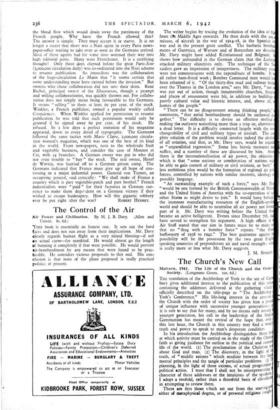The Control of the Air
Tilts book is essentially an honest one. It sets out the hard facts and does not run away from their implications. Mr. Davy clearly regards human flight as a very mixed blessing—if not an actual curse—for mankind. He would almost go the length of banning it completely if that were possible. He would prevent air-bombardment by any means that were found to be prac- ticable. He considers various proposals to this end. His con-• clusion is that none of the plans proposed is really practical politics at present. The writer begins by tracing the evolution of the idea of from tits Middle Ages onwards. He then deals with the use, misuse, of aircraft in the war of 1914-18, in the Spanish a war and in the present great conflict. The barbaric born ments of Guefnica, of Warsaw and of Rotterdam are descri Mr. Davy might have added Kristiansund and Belgrade. shows how unfounded is the German claim that the Luf tw attacked military objectives only. The technique of the N raiders gave an impression of inexpertness. The military res were not commensurate with the expenditure of bombs. It all rather ham-fisted work; Command men would ha been ashamed of it. " Of te thirty-five road and railway brid over the Thames in the London area," says Mr. Davy, " not was put out of action, though innumerable churches, hospi and places of amusement were hit, in addition to buildings purely cultural value and historic interest, and, above all, homes of the people."
" There can be no disagreement among thinking people," comments, " that aerial bombardment should be outlawed al gether." The difficulty is to devise an effective method making the outlawry something more than a trap or, alternative a dead letter. It is a difficulty connected largely with the in changeability of civil and military types of aircraft. The c plete solution of the problem would involve indeed the aboli of all aviation, and that, as Mr. Davy says, would be rega as " unparalleled regression." Some less heroic measures suffice, and a number of these are discussed by him. Am them is the internationalisation of air power, the objection which is that " some nations or combination of nations mt be able to gain control of military or civil aviation, or both." less ambitious plan would be the formation of regional air po' forces, controlled by nations with similar interests, ideology possibly language.
" An outstanding example of such a force," says Mr. Da " would be one formed by the British Commonwealth of Nat and the United States of America with the co-operation of s other States as might desire to join." It would have behind the immense manufacturing resources of the English-spe world and should be able to neutralise all air power not fo part of it. Mr. Davy was writing before the United So became an active belligerent. Events since December 7th, have served to strengthen his argument. A high officer of Air Staff stated that our aim in future must be to make s that no " thug with a bomber force " repeats " the b buffoonery of 1938 to 1942." The best guarantee against possibility will be the possession by the two great Engl speaking countries of preponderant air and naval strength: as is really more or less what Mr. Davy suggests.
J. M. Swum


























 Previous page
Previous page